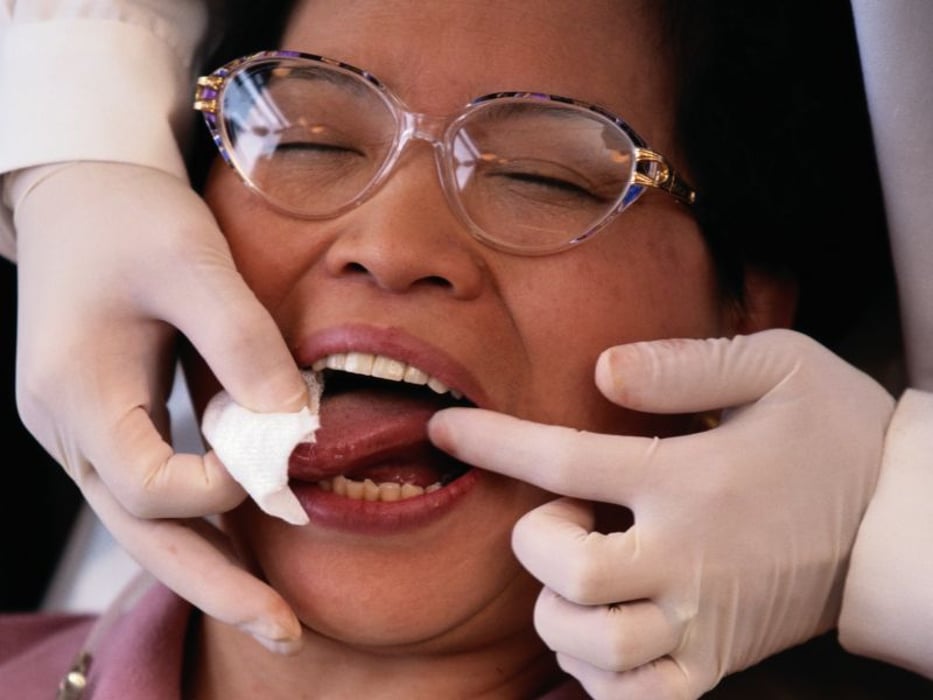Warning Signs of Oral Cancer

TUESDAY, April 25, 2023 (HealthDay News) -- Do you know the warning signs of oral cancer?
Some oral cancer symptoms are common and easily identifiable. Other symptoms are surprising, and you might miss them.
First, what is oral cancer?
According to the American Dental Association, the term “oral cancer” encompasses throat, mouth, tongue and jaw cancer. The American Cancer Society estimates there will be approximately 54,540 new cases of oral or oropharyngeal cancer, with approximately 11,580 deaths, in the United States in 2023. These cancers commonly occur in the tongue, tonsils and oropharynx (the throat area behind the mouth), gums and other areas of the mouth.
Here, experts break down the symptoms of oral cancer you should be aware of, plus how to prevent oral cancer.
Common warning signs of oral cancer:
- A sore on your lips/mouth: Your health care provider should evaluate a sore or irritation that lasts longer than two weeks. The Cleveland Clinic states that the sore may appear reddish on your lips. If you have darker skin, it may appear brown or gray. Inside your mouth, the sore may occur as a red or white sore that doesn’t heal.
- Patches in your mouth/throat: The Cleveland Clinic says that patches inside your mouth you cannot scrape away can indicate precancerous conditions. Leukoplakia is the word used to describe flat white or gray patches in your mouth or throat. Erythroplakia describes a slightly raised or red flat patch. Erythroleukoplakia describes patches that are both red and white.
- Difficulty swallowing/sore throat: Difficulty swallowing (dysphagia) or a sore throat (pharyngitis) that doesn’t go away can indicate cancer. According to Johns Hopkins, you may feel as though your food is stuck in your chest or have increased pain when swallowing.
- Hoarseness: Laryngeal cancer (the area of the throat that contains the vocal cords) can cause hoarseness or changes in your voice. See your medical provider for hoarseness that lasts longer than two weeks.
- Neck mass: Typically, oropharyngeal cancers are asymptomatic. A lump in the neck is one of the first signs of throat cancer and should be evaluated by a medical provider.
Less common signs of cancer
- Ear pain
- Noisy breathing
- Coughing up blood
- Weight loss
- Loose teeth
How to prevent oral cancer
Dr. Barbara Burtness, chief translational research officer at Yale Cancer Center in New Haven, Conn., and chief of head and neck cancers/sarcoma at Yale, advised in a recent Yale article that, "You can help prevent head and neck cancer by stopping smoking, not using tobacco products and limiting alcohol use. Reducing your risk of infection from HPV [human papillomavirus] is also an important way to prevent the disease.”
- Don’t smoke tobacco: According to the American Cancer Society, tobacco use is one of the leading risk factors for head and neck cancers. The more you smoke, the greater your risk. Pipe smoking puts you at risk for lip cancer where the pipe stem touches your lips.
- Don’t use oral tobacco: Oral tobacco, also called chewing tobacco, is linked with cancer of the cheeks, gums and lips.
- Reduce or eliminate your use of alcohol: The Oral Cancer Foundation states that people who use both alcohol and tobacco are at an increased risk of developing the disease. Alcohol abuse (defined as more than 21 drinks per week) is the second-largest risk factor for developing oral cancer.
- Reduce your risk from HPV: Human papillomavirus is linked to oropharyngeal cancer (cancers of the tonsils and base of the tongue). HPV is spread primarily through sexual intercourse and oral sex. There is a vaccine available for individuals younger than 26 that the American Cancer Society says can prevent infection with the types of HPV linked to HPV-related cancers. Using a condom to avoid transmitting the virus during sex will also decrease your risk.
- Protect your lips from sun exposure: The Mayo Clinic recommends wearing a wide-brimmed hat to provide shade and using lip protection that contains sunscreen.
- See your dentist regularly: Dentists are trained to examine your mouth for abnormal areas that may indicate mouth cancer or precancerous changes.
Related Posts
Vaccination Key to ‘Super Immunity’ Against COVID-19
TUESDAY, Jan. 25, 2022 (HealthDay News) -- Coronavirus infections before or...
U.S. Gender-Affirming Surgeries Nearly Tripled in 3 Years
WEDNESDAY, Aug. 23, 2023 (HealthDay News) -- The number of Americans undergoing...
‘Three’s Company’ Star Suzanne Somers Dies From Cancer at 76
MONDAY, Oct. 16, 2023 (HealthDay News) -- Actress Suzanne Somers died...
Summer’s Near: What’s the Best Sunscreen for You?
WEDNESDAY, May 10, 2023 (HealthDay News) -- It’s easy to keep your skin safer in...
